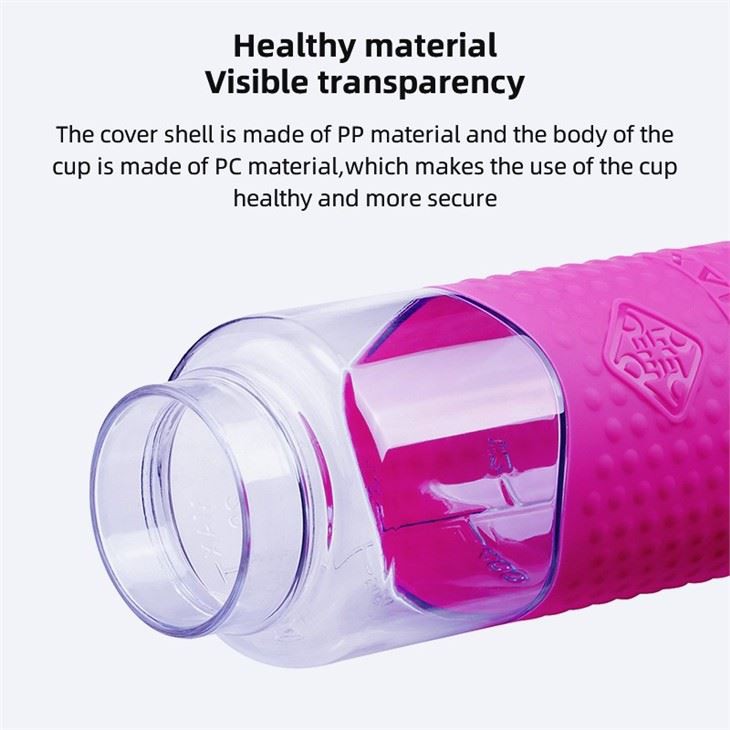Hey there! As a supplier of Safest Reusable Water Bottles, I often get asked if ceramic reusable water bottles are a safe choice. So, I thought I'd dive into this topic and share some insights with you.
First off, let's talk about why reusable water bottles are a great idea in the first place. Using a reusable water bottle helps reduce the amount of single - use plastic waste that ends up in landfills and oceans. It's an easy way to do your part for the environment. And when it comes to choosing a reusable water bottle, safety is definitely a top concern.
The Safety of Ceramic Reusable Water Bottles
One of the big advantages of ceramic water bottles is that they're generally made from natural materials. Ceramics are typically fired at high temperatures, which makes them non - porous. This means that they don't absorb flavors, odors, or chemicals from the liquids you put in them. So, if you're filling your bottle with flavored water, tea, or coffee, you won't have to worry about it tasting like yesterday's drink the next time you use it.
Ceramics are also free from harmful chemicals like BPA (bisphenol A). BPA is a chemical that has been linked to various health problems, including hormonal imbalances and developmental issues. Since ceramic bottles don't contain BPA, you can feel confident that you're not exposing yourself to this potentially harmful substance.
Another safety aspect is that ceramic is a food - grade material. It's commonly used in the production of kitchenware like plates, bowls, and mugs. This means that it's safe for contact with food and beverages. When you use a ceramic water bottle, you can be sure that the material won't leach any harmful substances into your water.

However, there are also some things to consider when it comes to the safety of ceramic water bottles. One of the main concerns is breakage. Ceramics are brittle, and if you drop your ceramic water bottle, it's likely to shatter. This can be dangerous, as you might cut yourself on the sharp pieces. So, you need to be extra careful when handling a ceramic water bottle. Make sure you use a protective case or sleeve to reduce the risk of breakage.

Comparing with Other Types of Reusable Water Bottles
Let's compare ceramic water bottles with some other popular types of reusable water bottles.
Plastic Water Bottles
Plastic water bottles come in different types. For example, we offer 650ml Tritan Plastic Drinking Water Bottles and Tritan Bpa Free Water Bottle. Tritan plastic is a great option because it's BPA - free, shatter - resistant, and lightweight. It's also more durable than ceramic in terms of impact resistance. You can throw a Tritan plastic bottle in your backpack without worrying too much about it breaking. However, some people are still skeptical about plastic in general, even if it's BPA - free, as there are concerns about other potential chemicals leaching from the plastic over time.
Stainless Steel Water Bottles
Stainless steel water bottles are known for their durability and insulation properties. They can keep your drinks cold for hours, which is great if you're out and about on a hot day. They're also resistant to dents and scratches. But, stainless steel can sometimes give your water a metallic taste, especially if the bottle isn't of high quality. And like ceramic bottles, they can be heavy, which might not be ideal if you're carrying it around all day.
How to Ensure the Safety of Your Ceramic Water Bottle
If you decide to go for a ceramic water bottle, here are some tips to ensure its safety.
- Inspect it regularly: Check for any cracks or chips in the bottle. Even a small crack can weaken the structure of the bottle and increase the risk of breakage.
- Clean it properly: Use mild soap and warm water to clean your ceramic water bottle. Avoid using abrasive cleaners, as they can scratch the surface of the ceramic.
- Store it carefully: When you're not using your bottle, store it in a safe place where it won't get knocked over or damaged.
Conclusion
So, are ceramic reusable water bottles a safe choice? Well, they have their pros and cons. On the one hand, they're made from natural, non - toxic materials and don't leach harmful chemicals into your water. On the other hand, they're prone to breakage, which can be a safety hazard.
Ultimately, the choice of a reusable water bottle depends on your personal preferences and lifestyle. If you're someone who is very careful with your belongings and wants a bottle that won't affect the taste of your drinks, a ceramic water bottle might be a good option for you. But if you're always on the go and need a more durable bottle, you might want to consider a plastic or stainless steel bottle.

If you're interested in exploring different options for reusable water bottles, feel free to check out our Safest Reusable Water Bottles collection. We offer a variety of high - quality, safe, and stylish reusable water bottles to suit your needs. Whether you're looking for a ceramic, plastic, or stainless steel bottle, we've got you covered. If you have any questions or want to discuss potential procurement, don't hesitate to reach out. We're always happy to help you find the perfect reusable water bottle for your requirements.

References
- Environmental Protection Agency. (n.d.). Reducing Plastic Waste. Retrieved from EPA website.
- World Health Organization. (2019). Chemicals in Plastics and Human Health. Geneva: WHO.
- Consumer Reports. (2020). Best Reusable Water Bottles. Retrieved from Consumer Reports website.


